Transitional living rooms represent the perfect harmony between timeless traditional charm and sleek contemporary sophistication. This design approach seamlessly blends classic furniture silhouettes with modern materials, creating spaces that feel both familiar and fresh. The beauty of transitional style lies in its ability to evolve with changing trends while maintaining an enduring appeal that never goes out of style. Whether you prefer the warmth of natural wood paired with crisp white walls, or the elegance of mixed metals against neutral upholstery, transitional design offers endless possibilities for creating your ideal living space. These 24 carefully curated transitional living room ideas showcase how to master this versatile style, incorporating elements like layered textures, balanced color palettes, and thoughtfully arranged furniture that invites both relaxation and conversation.
1. Neutral Foundation Living Room
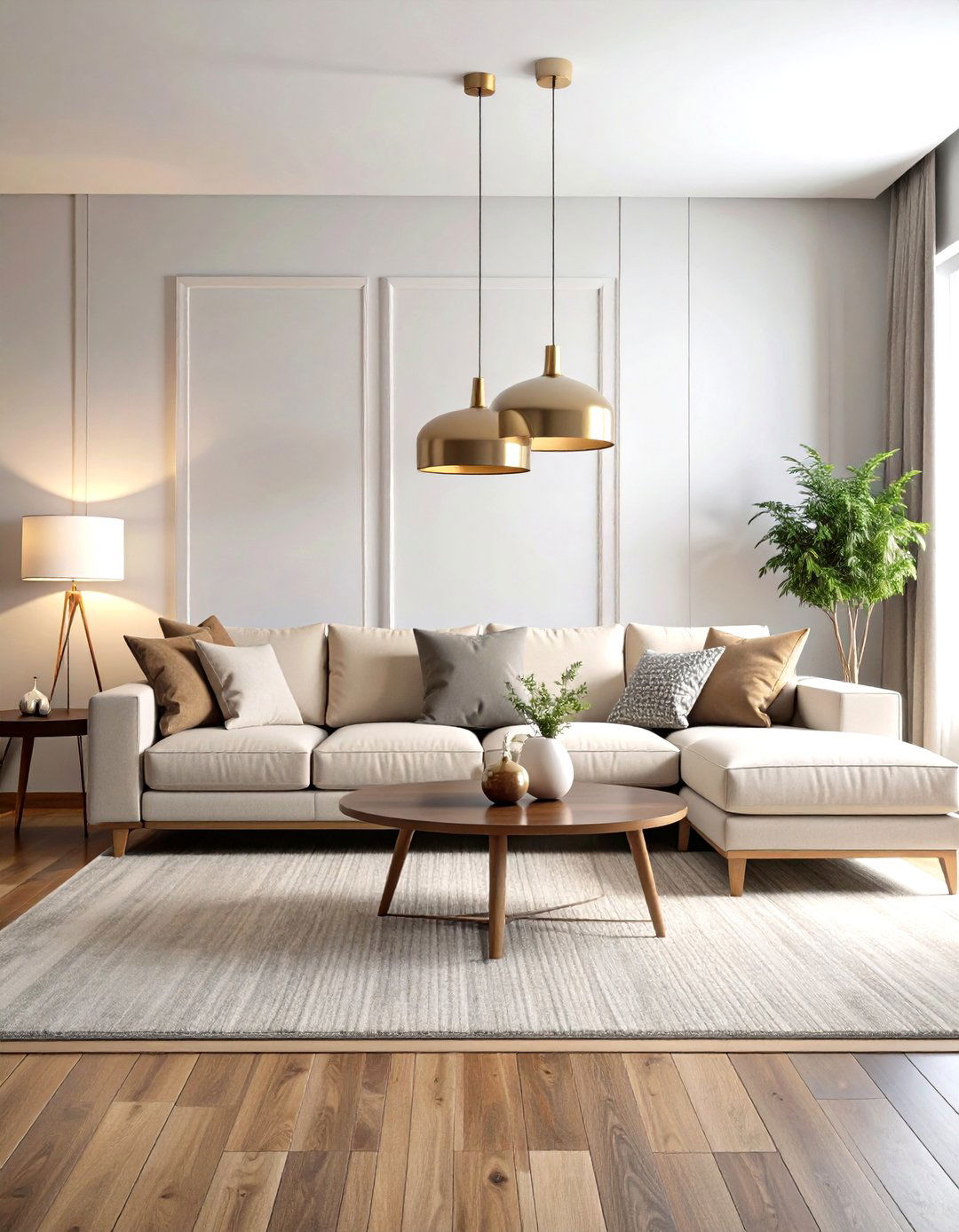
The foundation of exceptional transitional design begins with a carefully curated neutral palette. Beige, taupe, gray, and ivory tones create a calming backdrop that allows furniture and accessories to shine. Consider painting walls in warm white or soft gray, then layer in cream-colored sectional seating with linen throw pillows. What makes a neutral scheme feel sophisticated rather than bland? The answer lies in varying the tones and incorporating subtle contrast through darker wood coffee tables and bronze accent lighting. This timeless approach ensures your living room remains stylish while providing the perfect canvas for seasonal updates.
2. Mixed Texture Living Room

Texture plays a crucial role in transitional design, combining smooth surfaces with rich, tactile elements. Layer a plush velvet sofa with nubby linen pillows, then add a jute area rug beneath a sleek glass coffee table. How can you create visual interest without overwhelming the space? Focus on contrasting textures like smooth leather chairs paired with a rough-hewn wood console. The interplay between polished metal lamp bases and soft chenille throws creates depth and prevents the neutral palette from feeling flat. This textural layering adds sophistication while maintaining the comfortable, lived-in feel that defines transitional style.
3. Fireplace Focal Point Living Room

Transform your living room around a stunning fireplace that bridges traditional and modern elements. A white mantel with clean lines paired with built-in cabinetry creates seamless integration. Position a comfortable sectional perpendicular to the fireplace, creating an intimate conversation area while maintaining flow throughout the room. What fireplace materials work best in transitional design? Consider pairing classic brick with contemporary steel accents, or choose natural stone with a sleek wood mantel. Add modern artwork above the mantel and flank the fireplace with matching table lamps to create a balanced, symmetrical arrangement that feels both formal and welcoming.
4. Sectional Layout Living Room
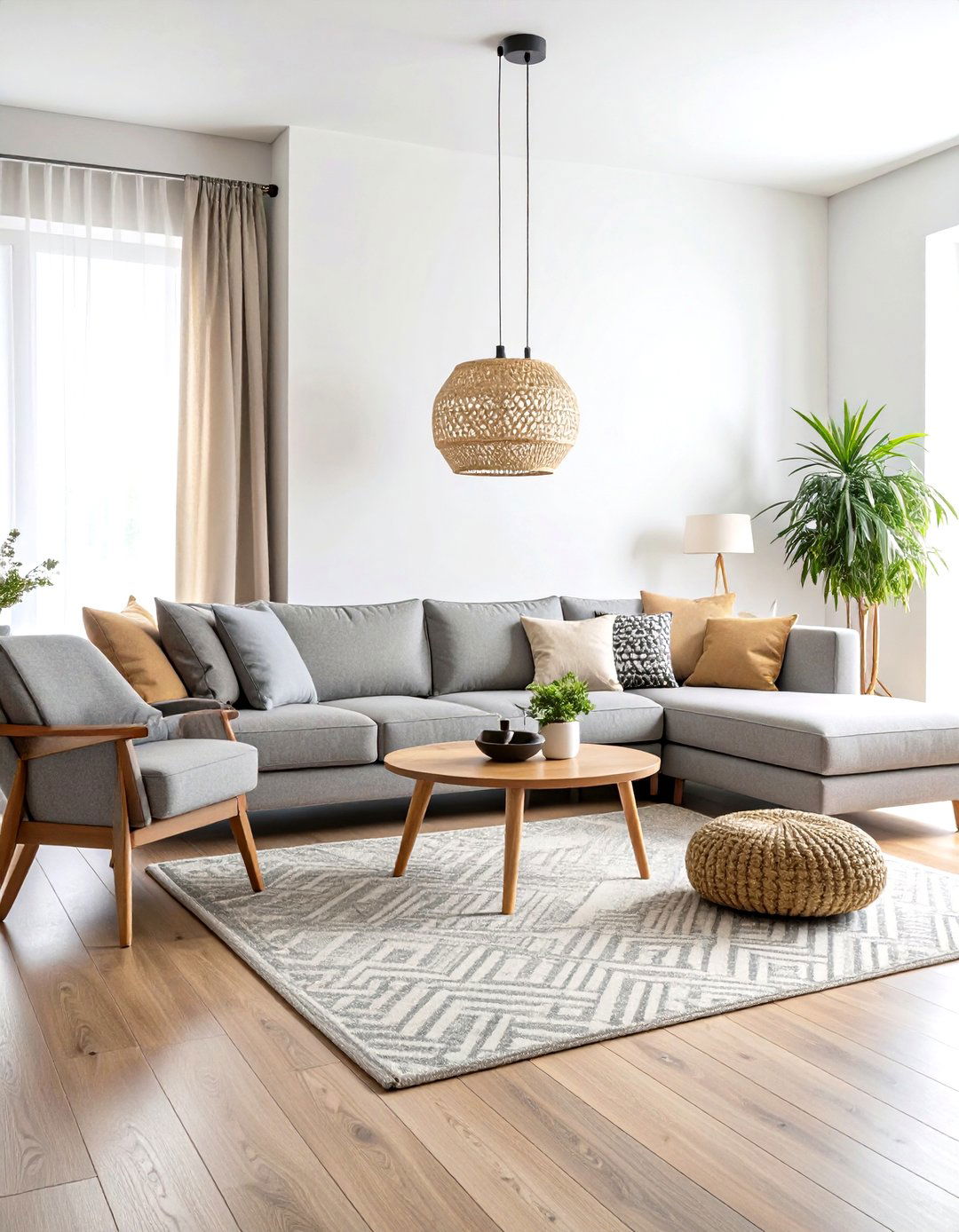
Large sectional sofas in neutral fabrics with generous cushions create the perfect foundation for transitional family rooms. Choose an L-shaped sectional in soft gray linen, then add structured accent chairs in complementary tones. How do you prevent a large sectional from overwhelming the space? Balance the substantial seating with a delicate glass coffee table and streamlined side tables. The key lies in mixing the sectional's casual comfort with more formal elements like a tailored ottoman or geometric area rug. This arrangement encourages both family movie nights and elegant entertaining.
5. Natural Materials Living Room

Embrace the warmth of natural materials that define sophisticated transitional living spaces. Wood furniture with visible grain patterns, combined with stone and leather elements, creates timeless appeal. Feature a live-edge wood coffee table surrounded by linen-upholstered seating and a natural fiber rug. What's the secret to balancing rustic and refined elements? Pair rough stone accent walls with polished marble side tables, or combine a reclaimed wood console with sleek metal hardware. The organic textures and neutral tones create a grounding presence that makes the space feel connected to nature while maintaining contemporary sophistication.
6. Layered Lighting Living Room

Master the art of transitional lighting by combining traditional and contemporary fixtures throughout your living space. Mix table lamps with modern chandeliers and contemporary floor lamps for balanced illumination. Install a statement pendant light above the seating area, then add classic brass table lamps on side tables. How do you create ambiance without sacrificing functionality? Layer overhead lighting with task lighting and accent lights, using dimmer switches to control mood throughout the day. The combination of warm metal finishes and clean-lined shades ensures your lighting feels intentional rather than collected, creating a cohesive glow that enhances both daytime and evening activities.
7. Subtle Color Accent Living Room

While neutrals dominate transitional design, strategic color placement adds personality and visual interest. Bold colors work best as accents in pillows, artwork, or decor to add depth without overwhelming the space. Choose a soft blue or sage green as your accent color, incorporating it through throw pillows, a single accent chair, or artwork. Where should you place color for maximum impact? Consider a colorful area rug that ties together all the neutral furniture, or add interest through a collection of ceramic vases in varying heights. This restrained approach to color ensures your space feels fresh and contemporary while maintaining the serene quality that makes transitional rooms so appealing.
8. Open Concept Living Room

Open floor plans work beautifully with transitional design, creating spacious, uncluttered environments. Define the living area within an open space using furniture placement rather than walls. Position a console table behind your sofa to create separation from the dining area while maintaining visual flow. How do you maintain cohesion across connected spaces? Use consistent materials and colors throughout the open layout, such as matching wood finishes or repeating a signature fabric pattern. The key is creating distinct zones that feel connected rather than divided, allowing natural light to flow freely while maintaining the functional needs of each area.
9. Built-In Storage Living Room

Custom built-ins flanking fireplaces or entertainment centers provide both storage and architectural interest. Design floor-to-ceiling cabinetry in crisp white with adjustable shelving for books, decorative objects, and media equipment. What makes built-ins feel custom rather than generic? Incorporate a mix of open shelving and closed storage, varying the shelf heights to accommodate different objects. Add interior lighting to highlight displayed items and choose hardware that coordinates with other metals in the room. These architectural elements create a polished, finished look while maximizing storage in a streamlined way that supports the transitional aesthetic.
10. Traditional-Modern Furniture Mix Living Room

Transitional spaces excel at pairing curved traditional furniture with straight-lined contemporary pieces. Combine a classic rolled-arm sofa with a sleek glass coffee table and modern accent chairs. How do you achieve balance when mixing different furniture styles? Focus on proportion and scale, ensuring that each piece complements rather than competes with others. The secret lies in finding common elements like similar wood tones or repeated shapes that create visual connections. This thoughtful combination creates spaces that feel collected over time rather than purchased all at once, adding character and sophistication to your living room.
11. Fabric Combination Living Room
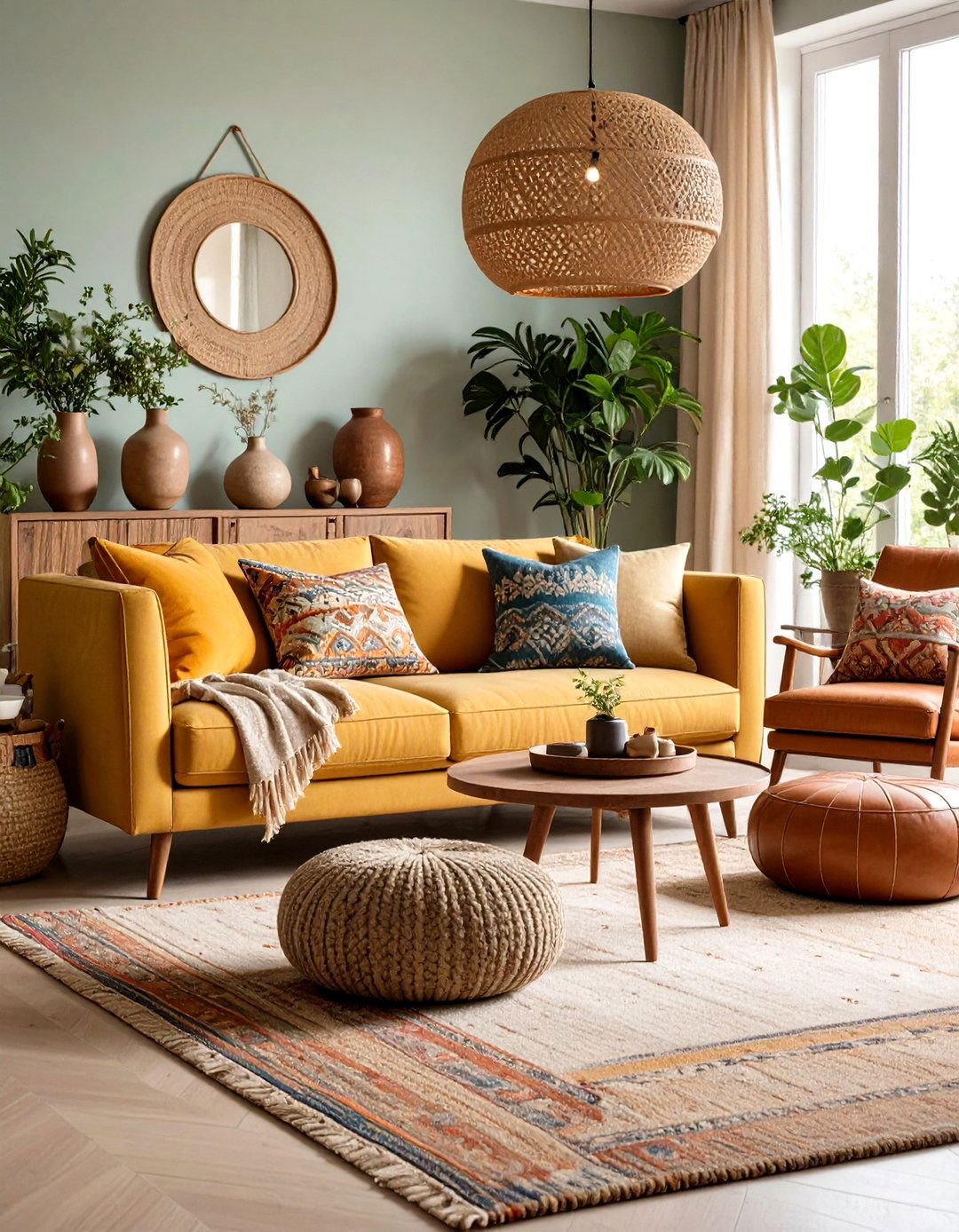
The transitional style offers considerable latitude with fabrics, allowing graphic patterns to coexist with textured solids. Layer a solid linen sofa with patterned throw pillows in geometric or subtle floral designs. Which fabric combinations work best for achieving transitional style? Consider pairing smooth leather with nubby bouclé, or combining cotton with velvet for varied tactile experiences. The key is maintaining a cohesive color story while varying textures and patterns. Choose fabrics that feel substantial and well-made, as quality materials are essential to achieving the refined look that characterizes successful transitional interiors.
12. Metal Accent Living Room

Metallic finishes in brass, nickel, or bronze add contemporary sophistication to traditional elements. Incorporate mixed metals through lighting fixtures, picture frames, and decorative accessories rather than matching everything perfectly. What's the best way to mix metals without creating chaos? Choose one dominant metal as your primary finish, then add touches of a second metal in smaller doses. For example, feature brass table lamps as your main metal, then add bronze picture frames and copper planters as accents. This approach creates visual interest while maintaining the sophisticated restraint that defines transitional style.
13. Stone Feature Living Room
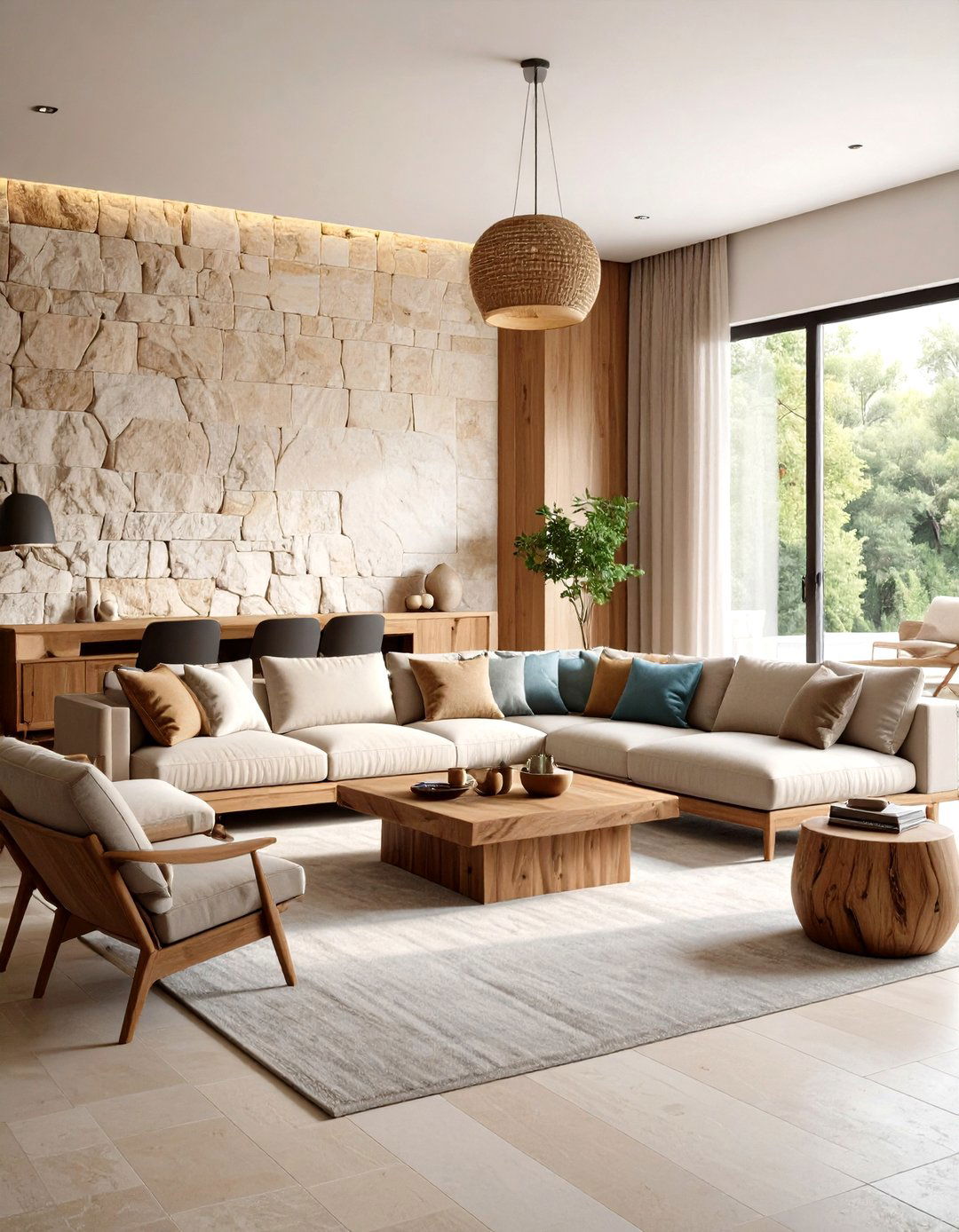
Natural stone elements bring earthy sophistication to transitional living spaces. Stone fireplaces with neutral surrounds create striking focal points. Consider a limestone or travertine accent wall behind your sofa, paired with warm wood furniture and soft textiles. How do you prevent stone from feeling too rustic or cold? Balance the natural texture with polished surfaces like marble side tables or glass accessories. The contrast between rough stone and refined finishes creates the perfect transitional blend. Choose stones in neutral tones that complement your overall color palette, ensuring the natural element enhances rather than dominates your carefully curated space.
14. Wood Element Living Room

Wood furniture and timber floors work equally well in both modern and traditional decor. Feature rich walnut or oak pieces with visible grain patterns, balanced by lighter painted furniture and soft textiles. What wood tones work best in transitional rooms? Medium-toned woods like cherry or maple provide warmth without overwhelming neutral palettes. Mix wood species subtly through different furniture pieces, maintaining harmony through similar stain tones or natural finishes. The organic warmth of wood creates a welcoming foundation that makes contemporary furniture feel less austere while adding timeless appeal that never goes out of style.
15. Glass Element Living Room

Introduce transparency and lightness through strategic glass elements that maintain visual flow. Choose a glass coffee table that doesn't obstruct sightlines, paired with crystal table lamps and mirrored accents. How does glass enhance transitional design? The transparency adds visual interest while maintaining the clean, uncluttered aesthetic. Glass reflects light and makes spaces feel larger, particularly important in transitional rooms that emphasize openness. Consider glass hurricane lanterns for ambient lighting, or a glass-front cabinet to display cherished objects while maintaining the streamlined appearance. The key is using glass purposefully rather than just for decoration, ensuring each piece serves both function and form.
16. Furniture Arrangement Living Room

Design your layout for both comfort and function, arranging seating to encourage interaction while ensuring plenty of space for movement. Create multiple conversation areas using a sofa, two chairs, and an ottoman arranged around a central coffee table. What's the secret to furniture arrangement that feels both formal and relaxed? Focus on creating balance through symmetry and proportion, while ensuring clear pathways throughout the room. Angle chairs slightly toward each other to encourage conversation, and include a mix of seating heights for visual interest. This thoughtful arrangement supports both intimate family time and larger gatherings.
17. Window Treatment Living Room

Frame your windows with treatments that enhance rather than overwhelm your transitional design. Light, neutral fabrics in simple styles complement the clean aesthetic. Choose linen or cotton panels in crisp white or soft gray, hung from sleek metal rods. How do window treatments contribute to transitional style? They should feel substantial enough to provide privacy and light control while maintaining the room's sophisticated simplicity. Consider layering sheer panels with heavier drapes for versatility, or choose Roman shades in natural fabrics for a tailored look. The goal is window treatments that feel integral to the room's design rather than afterthoughts.
18. Flooring Choice Living Room
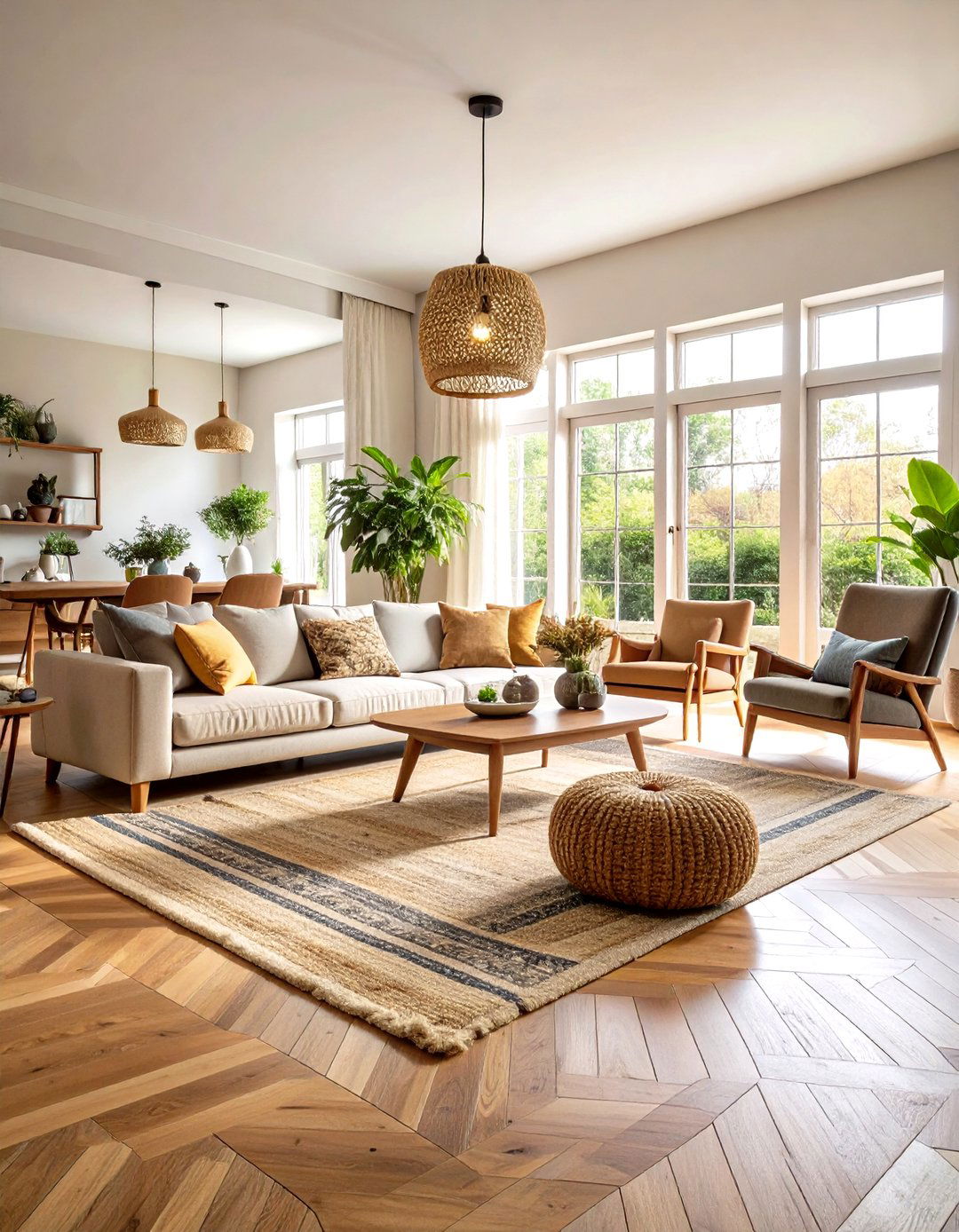
Traditional hardwood flooring works beautifully in transitional spaces, providing warmth and timeless appeal. Choose medium-toned oak or maple with subtle grain patterns, then layer neutral area rugs to define seating areas. What flooring materials best support transitional design? Natural materials like wood, stone, or high-quality luxury vinyl that mimics natural textures work beautifully. The key is choosing finishes that feel substantial and well-crafted. Area rugs in natural fibers like jute or wool add softness and help define different zones within open floor plans while contributing to the layered texture that makes transitional rooms so appealing.
19. Wall Treatment Living Room

Create visual interest through subtle wall treatments that add dimension without overwhelming the space. Consider board and batten wainscoting painted in soft white, paired with neutral wall color above. How do you add architectural detail while maintaining clean lines? Wainscoting and wall paneling provide traditional elements that work with contemporary furnishings. Choose treatments with simple profiles rather than ornate moldings, maintaining the sophisticated restraint that characterizes transitional style. Alternatively, create an accent wall using natural materials like reclaimed wood or stone, balancing the texture with smooth, painted surfaces elsewhere in the room.
20. Storage Solution Living Room
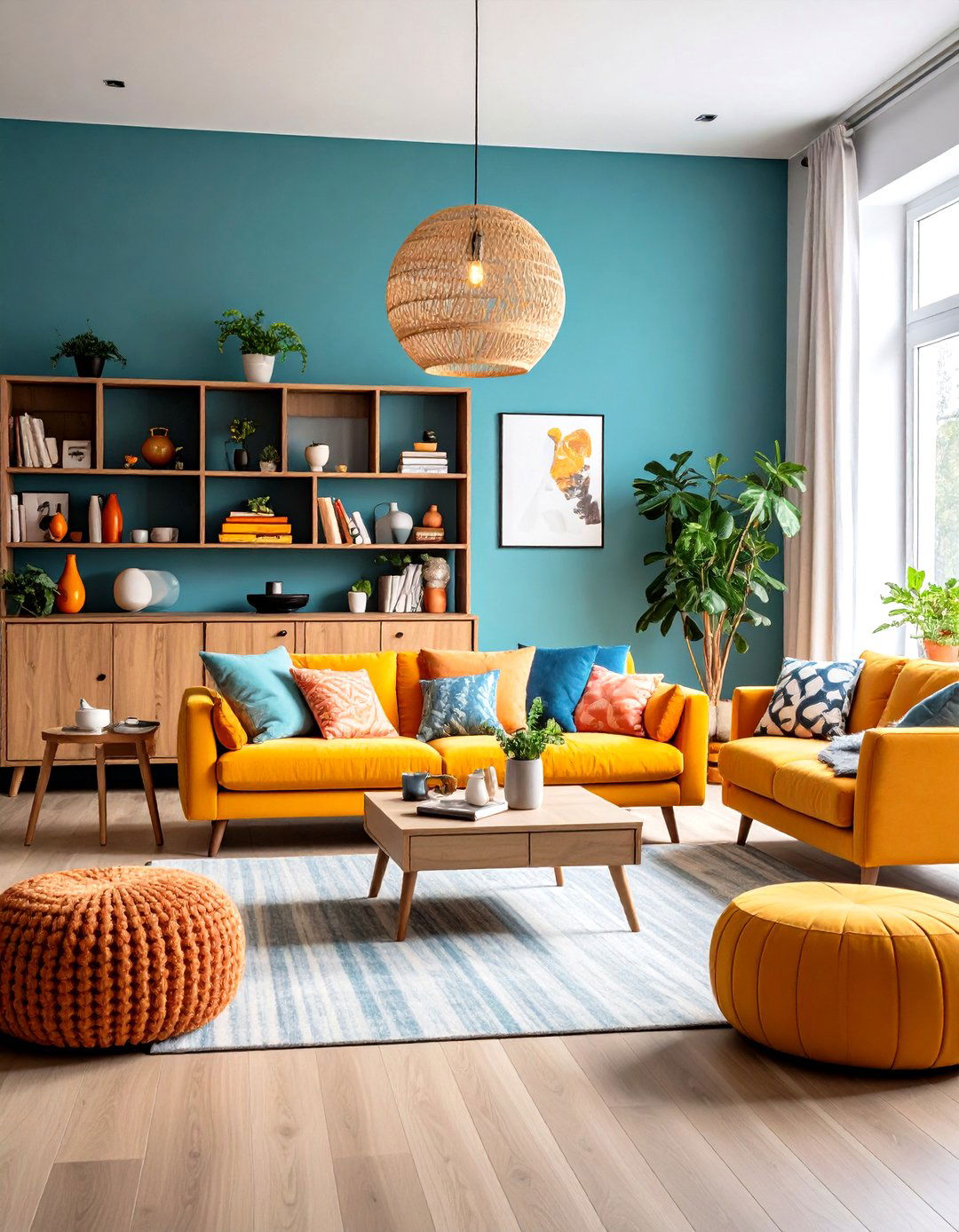
Incorporate smart storage solutions that maintain the clean, uncluttered aesthetic essential to transitional design. Built-in cabinets, bookcases, and entertainment centers provide organized storage while adding architectural interest. Choose furniture pieces that serve double duty, like ottomans with hidden storage or coffee tables with drawers. What's the best approach to storage in transitional rooms? Focus on concealed storage that maintains clean lines, using cabinets with simple hardware and furniture with integrated storage features. The goal is keeping everyday items organized and out of sight while displaying only carefully chosen decorative objects that enhance your overall design.
21. Artwork Display Living Room

Gallery walls with coordinated frames showcase personal style while maintaining sophisticated presentation. Create a curated collection using similar frame styles in consistent finishes, mixing photography, prints, and paintings. How do you display art in transitional spaces? Focus on creating visual balance rather than perfect symmetry, choosing pieces that complement your neutral palette while adding personality. Consider a single large statement piece above the sofa, or create a gallery wall that tells a story. The key is selecting artwork that feels intentional and personal while supporting the overall color scheme and sophisticated aesthetic of your transitional living room.
22. Comfort Zone Living Room

Design your living room as the ultimate comfort zone while maintaining sophisticated style. Choose seating that's ample but not intimidating, with generous cushions and soft, inviting fabrics. Layer soft throws and pillows in coordinating neutrals for added coziness. What makes a living room truly comfortable without sacrificing style? Focus on quality upholstery fabrics that feel luxurious to the touch, and ensure adequate seating for your family's needs. The transitional approach balances comfort with formality, creating spaces that welcome relaxation while looking polished enough for entertaining. Include personal touches like family photos or cherished books that make the space feel lived-in and loved.
23. Entertainment Area Living Room

Create a sophisticated entertainment area that seamlessly integrates technology with transitional design. Choose media consoles with clean lines and ample storage for electronics and accessories. Mount the television at eye level and conceal wiring for a clean appearance. How do you incorporate modern technology into classic design? Choose entertainment furniture in finishes that coordinate with other pieces in the room, and consider built-in solutions that hide equipment when not in use. The goal is creating a functional entertainment space that doesn't dominate the room's aesthetic. Balance the large screen with artwork or decorative objects, ensuring the technology enhances rather than detracts from your carefully curated design.
24. Seasonal Adaptability Living Room

Design your transitional living room for easy seasonal updates that keep the space feeling fresh year-round. Focus on traditional furniture pieces as your foundation, then update contemporary accessories as trends change. Choose permanent elements in neutral tones, then add seasonal interest through pillows, throws, and decorative objects. What's the secret to creating adaptable spaces? Invest in quality foundational pieces that won't date quickly, then express seasonal style through easily changeable accessories. This approach allows you to embrace new trends without major renovations, ensuring your transitional living room continues to evolve while maintaining its sophisticated, timeless appeal that never goes out of style.
Conclusion:
Transitional living rooms offer the perfect solution for those who appreciate both classic elegance and contemporary functionality. By thoughtfully blending traditional comfort with modern sophistication, these spaces create environments that feel both timeless and current. The key to successful transitional design lies in maintaining balance through neutral color palettes, mixed textures, and carefully curated furniture combinations that honor both past and present design traditions. Whether you're drawn to the warmth of natural materials, the sophistication of layered lighting, or the functionality of built-in storage solutions, transitional style provides endless opportunities for personal expression while maintaining broad appeal. These 24 ideas demonstrate that transitional living rooms can be both deeply personal and universally welcoming, creating spaces where families gather, friends connect, and memories are made for years to come.


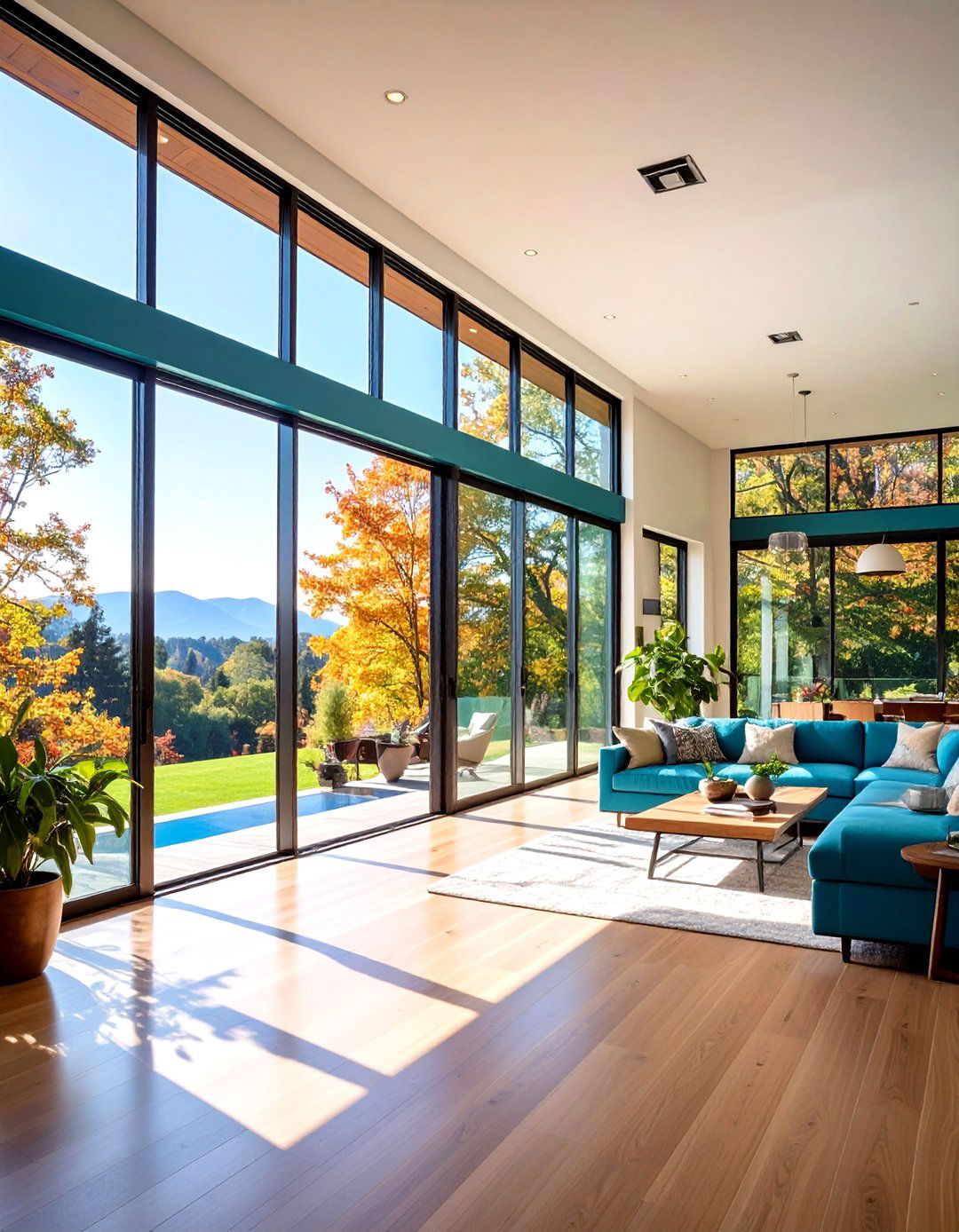

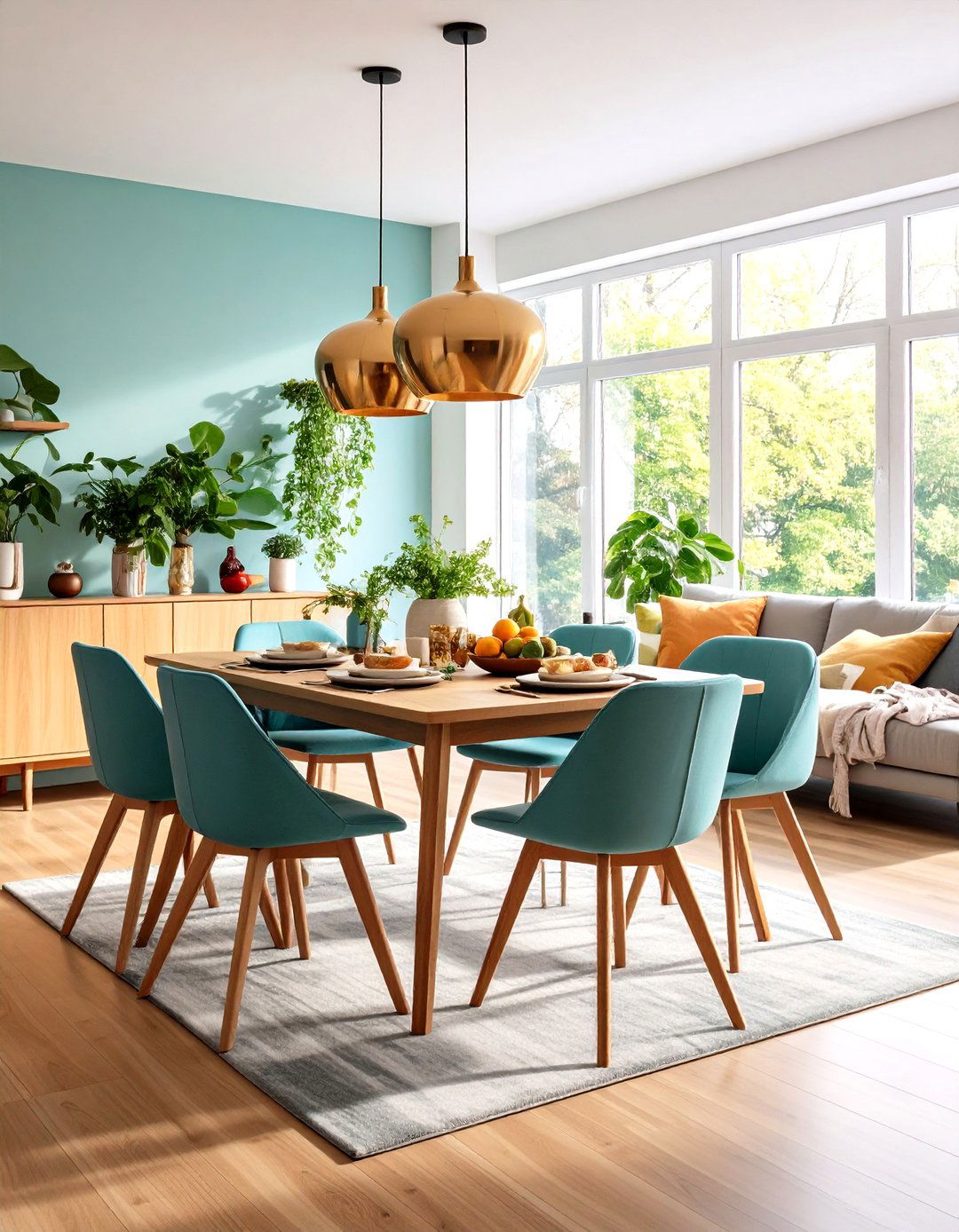
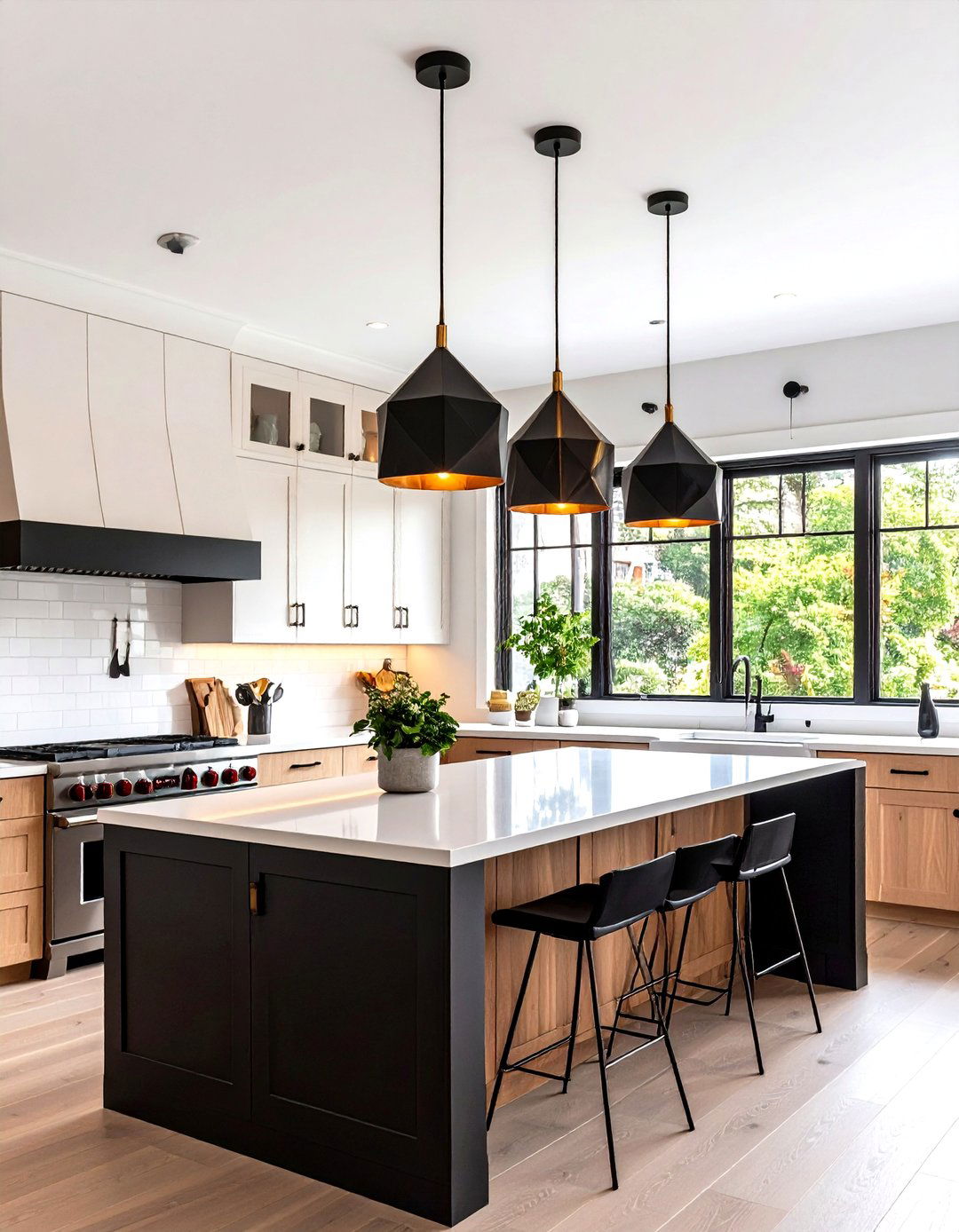
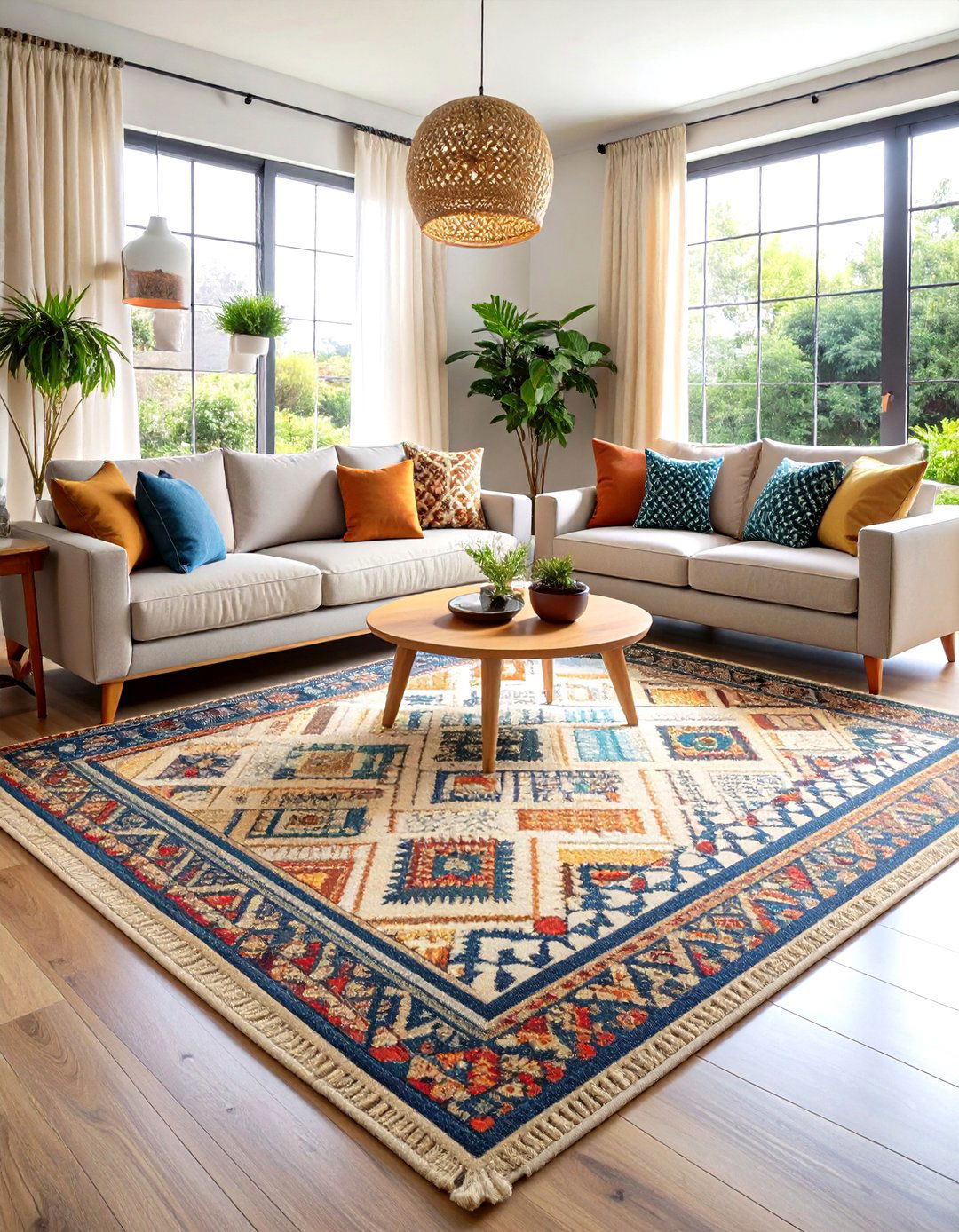

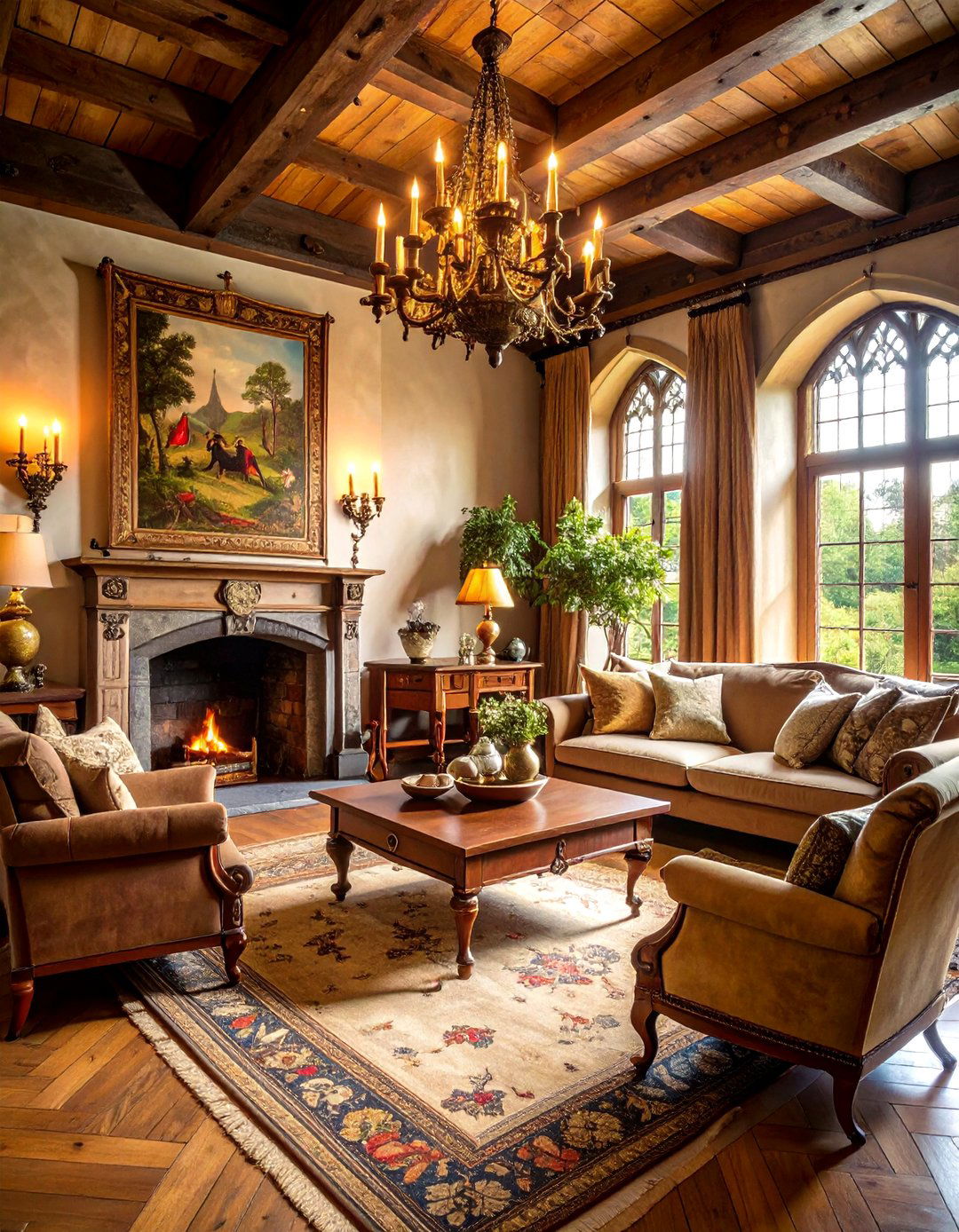
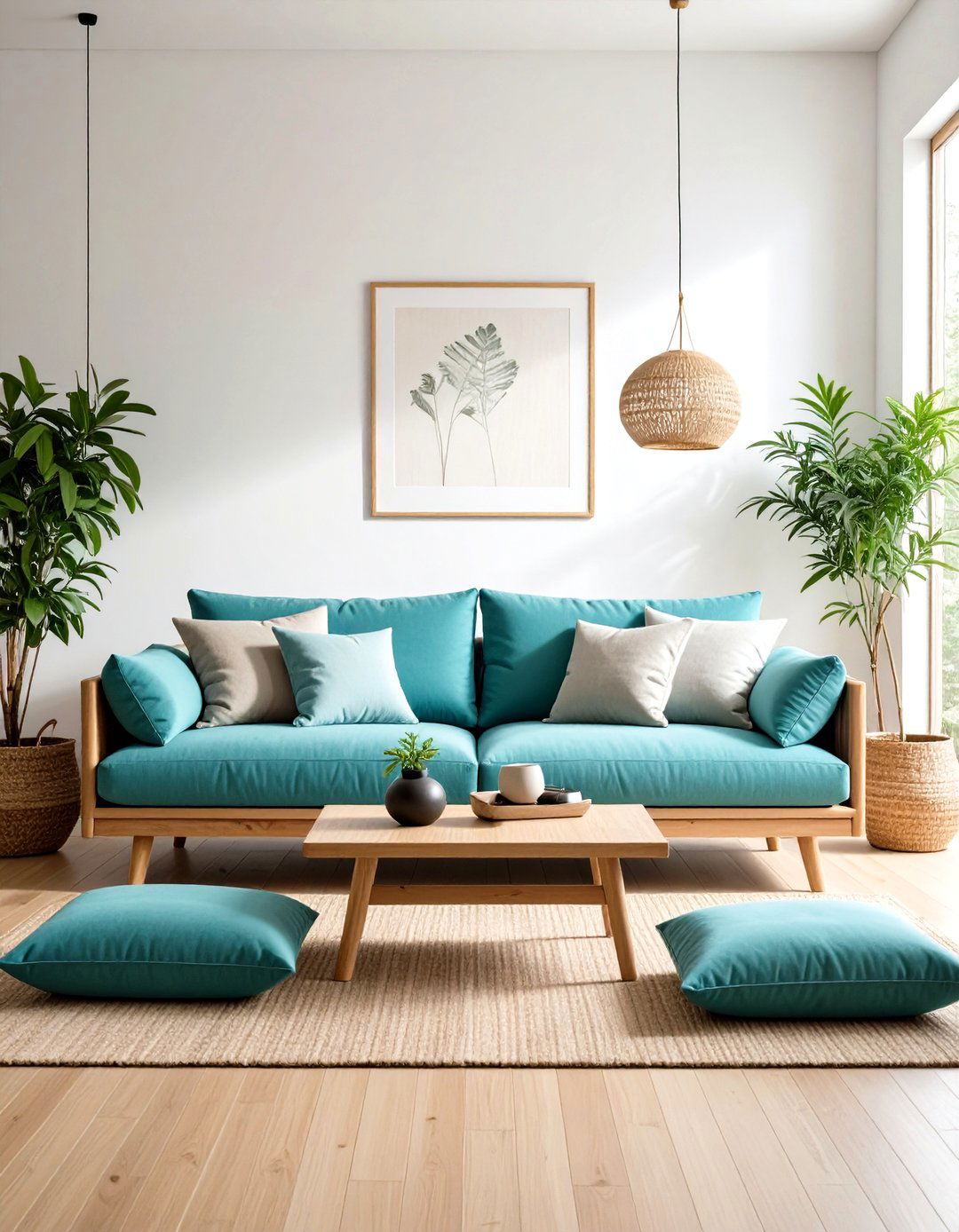


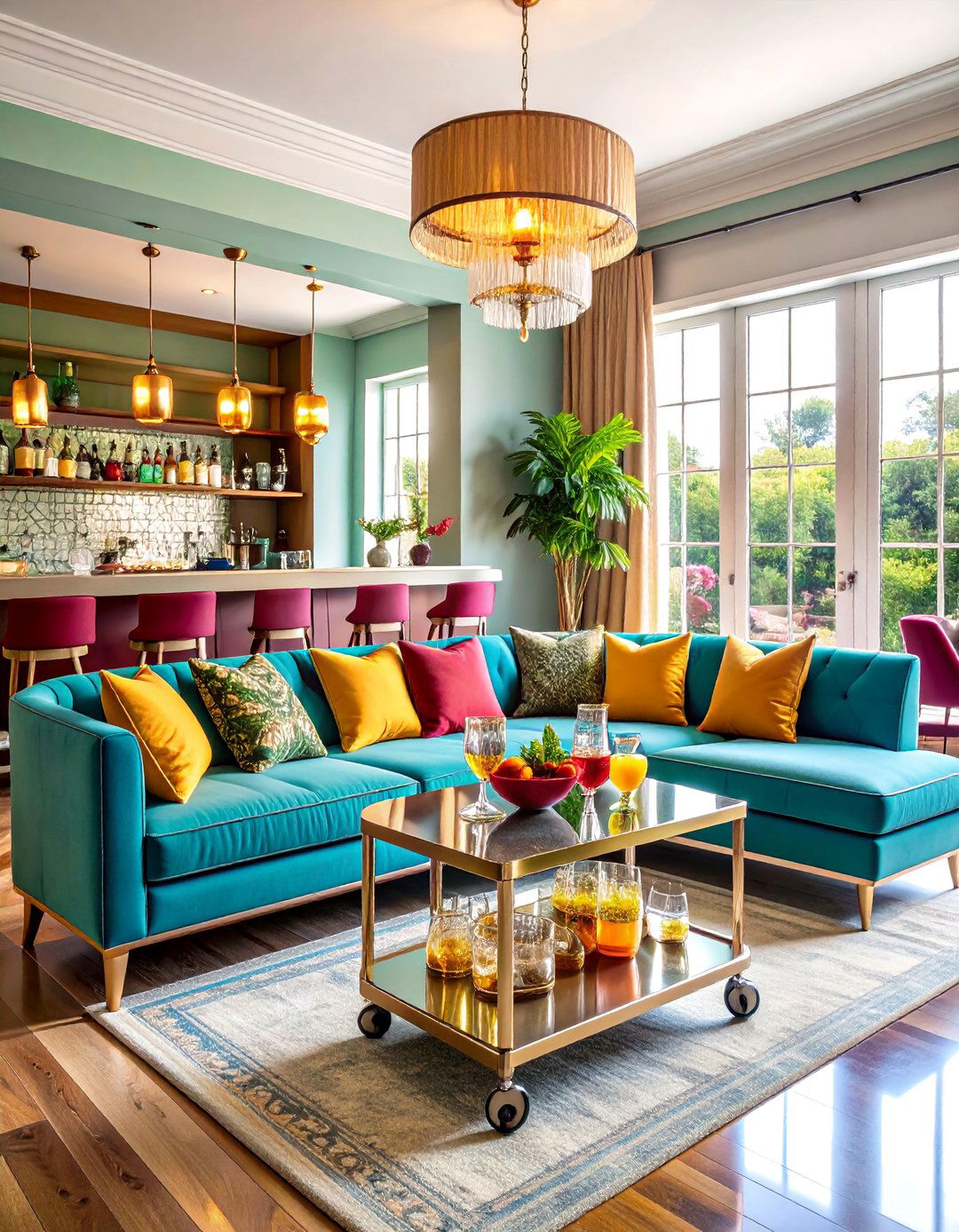
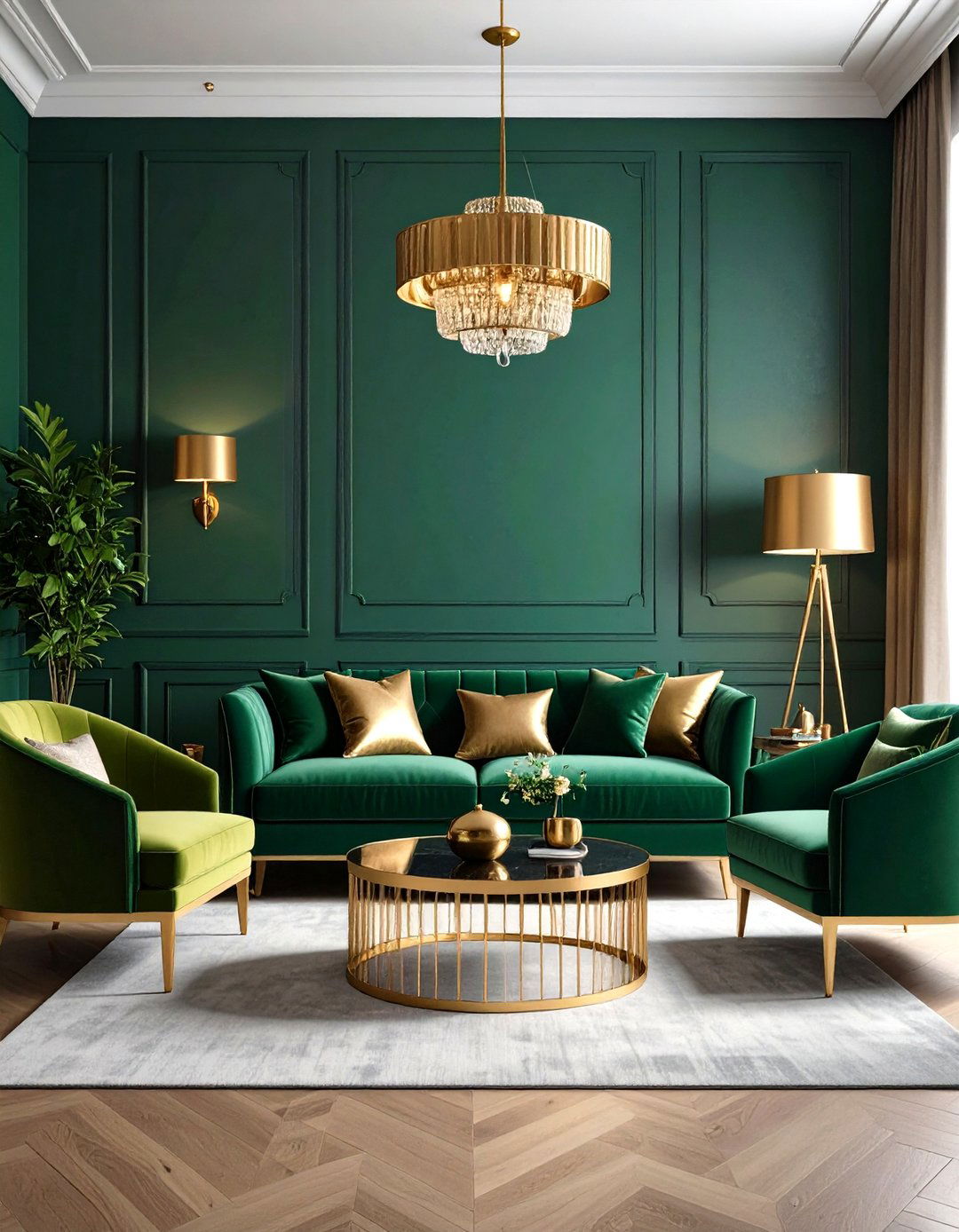
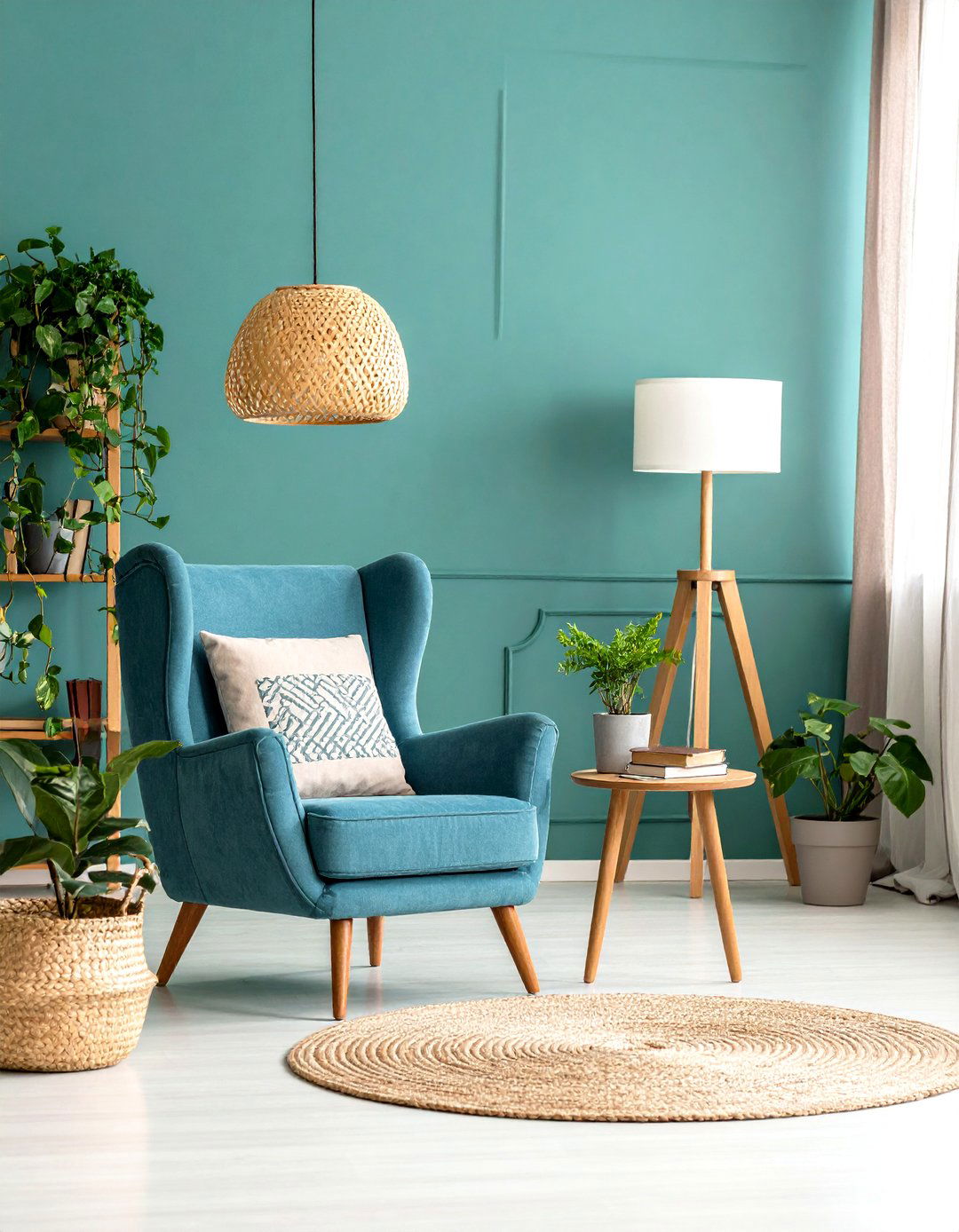
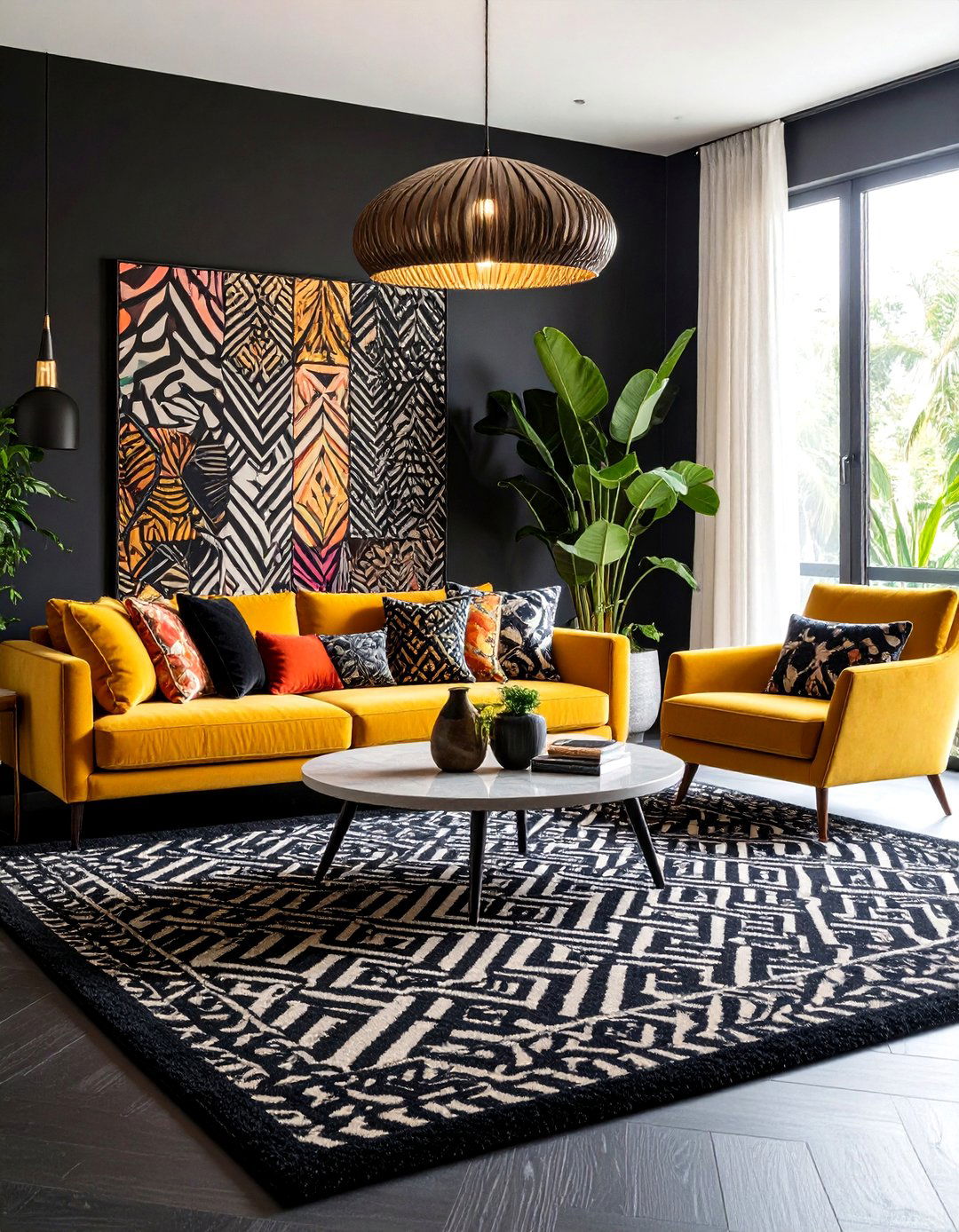
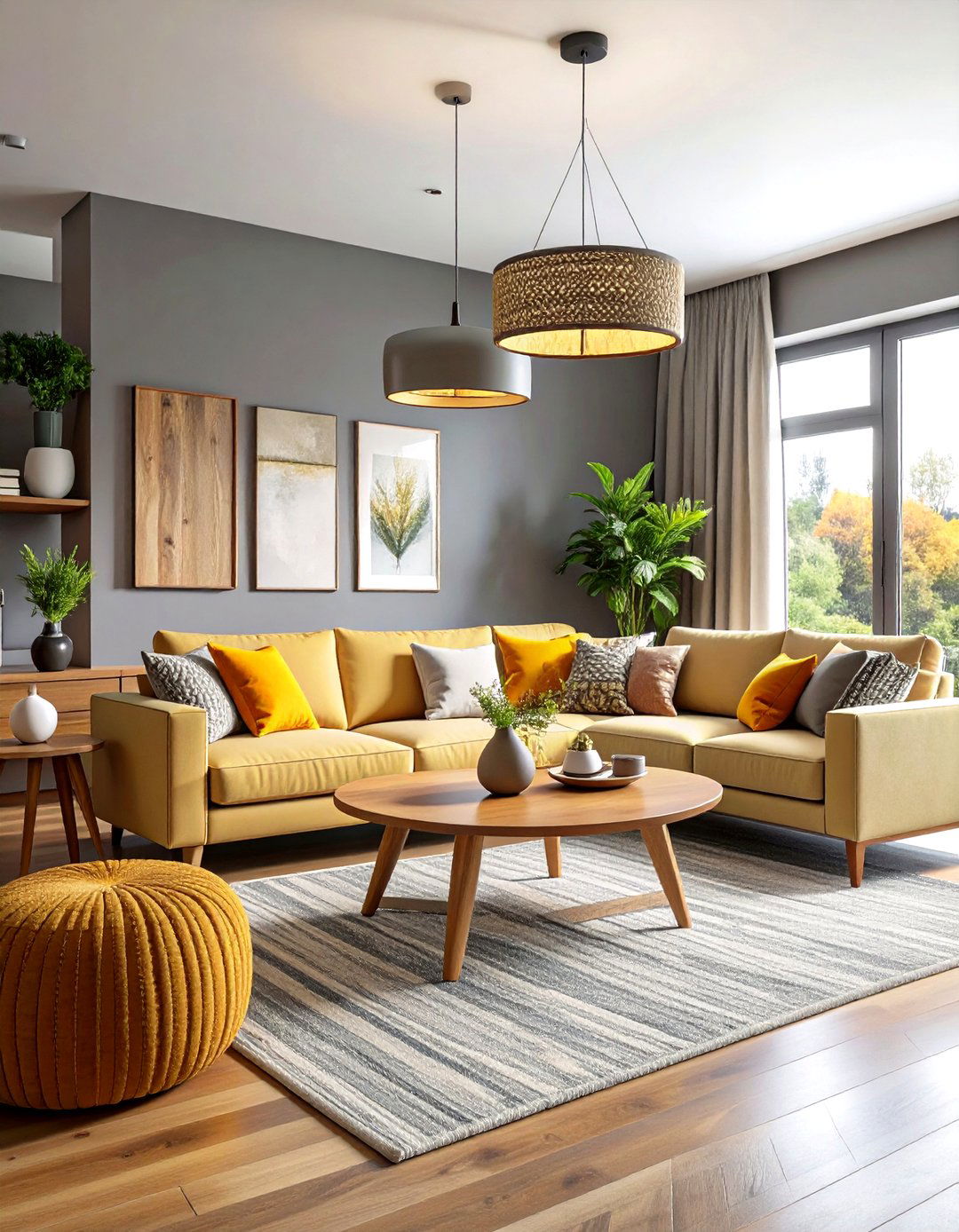
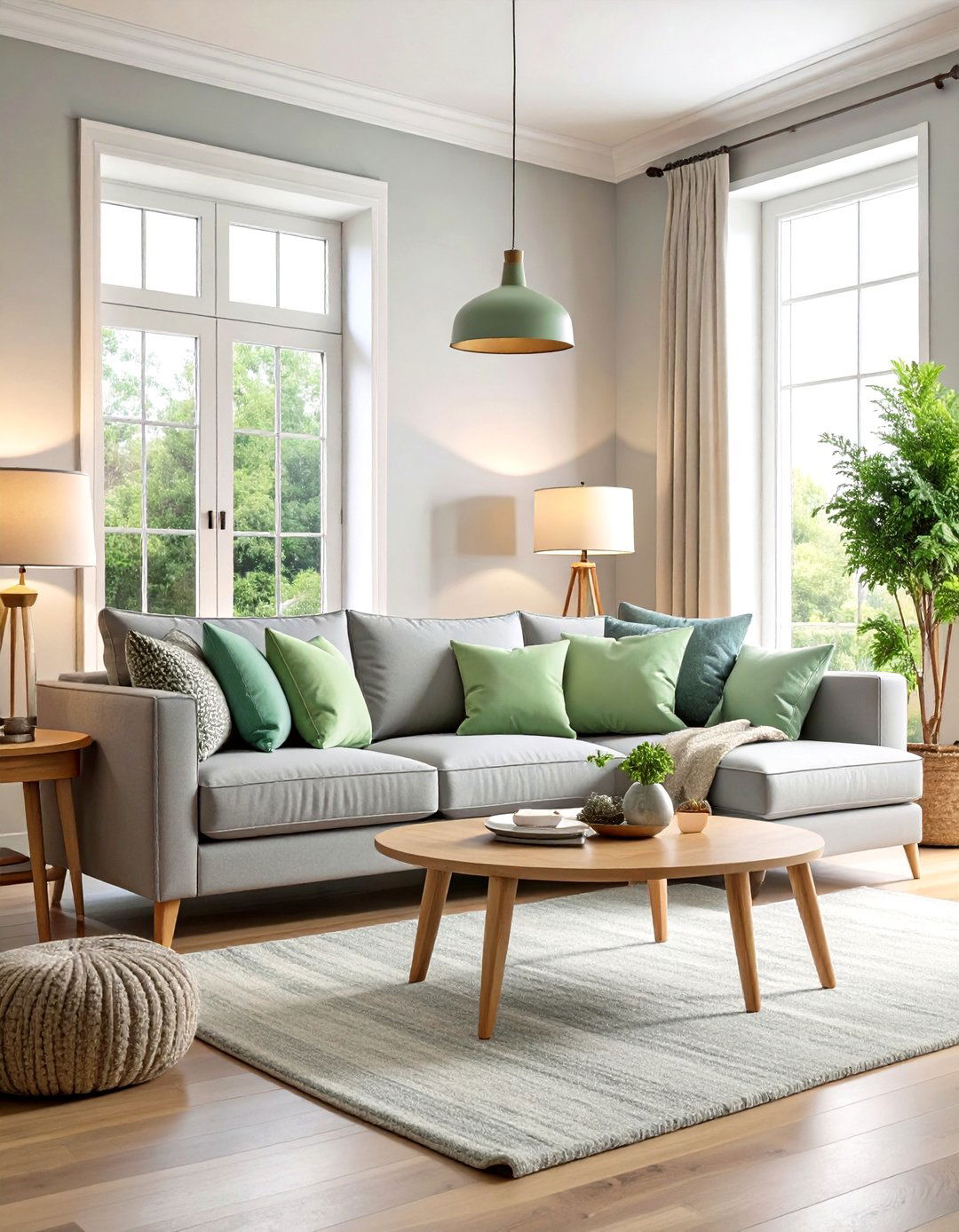

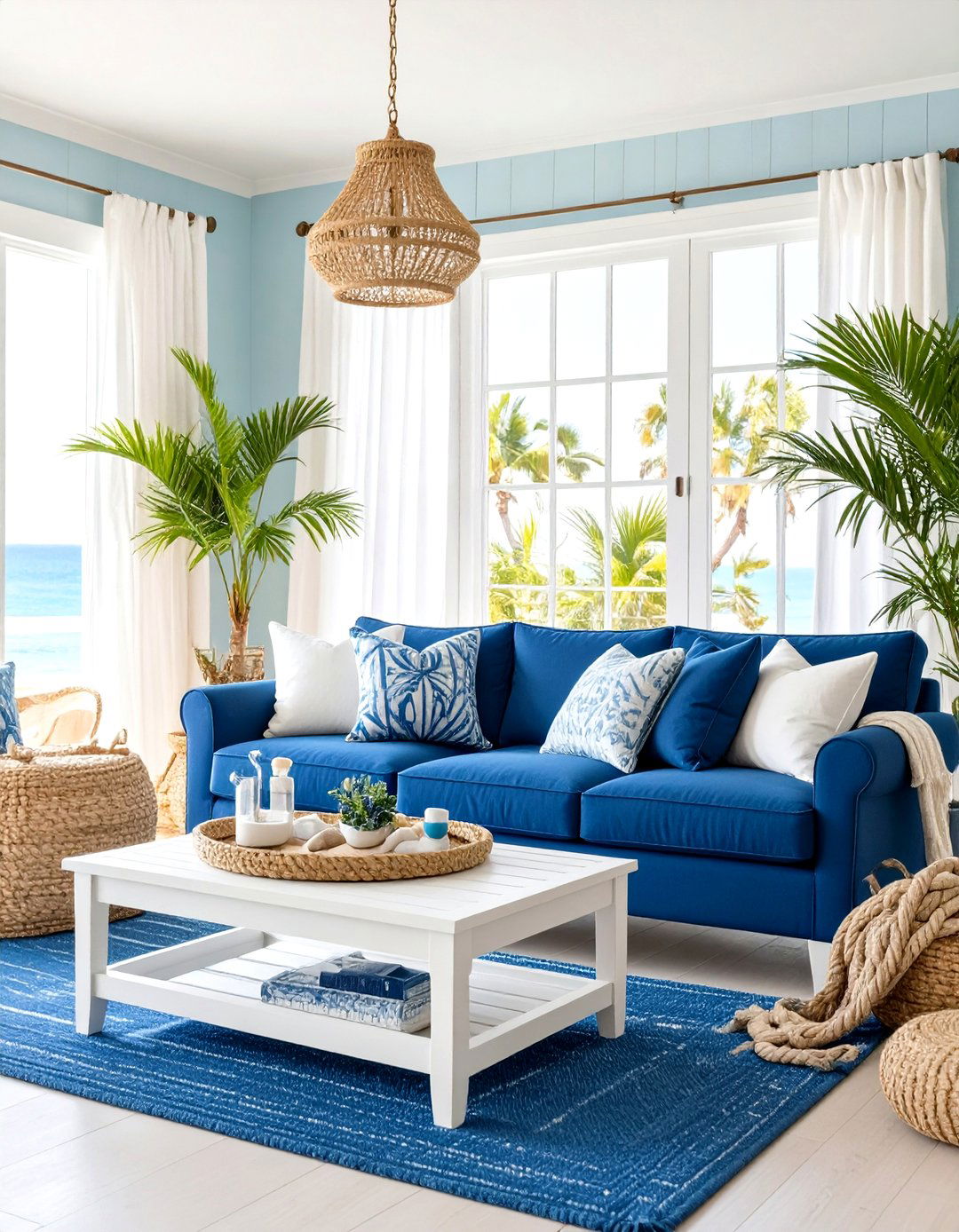
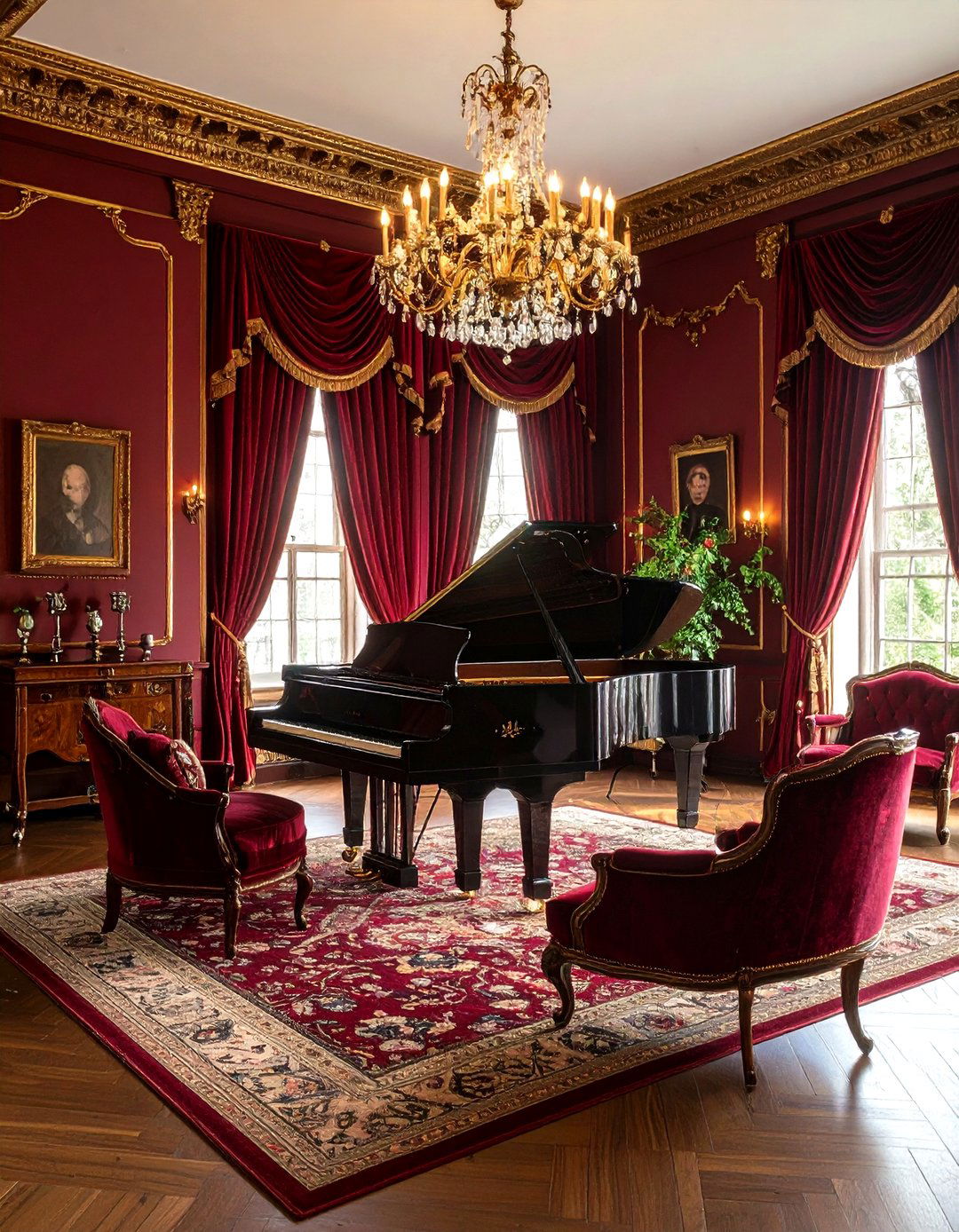
Leave a Reply